
9 Traditional Foods for Chinese New Year 2024
- What is the Chinese New Year?
- When is the Chinese New Year 2024?
- Chinese New Year Dates and Signs (2024-2034)
- How to Celebrate Chinese New Year
- Top Lucky Foods to Eat for the Chinese New Year
- Chinese New Year’s Dining Etiquette: Do and Don’t
- What is bad luck for the Chinese New Year?
- How to say Happy New Year in Chinese?
It’s almost time for the Chinese New Year, and to ensure we’re all ready to celebrate, we’ve put together a guide on what to eat during Chinese New Year and the top lucky foods in China.
The guide is also packed with useful information on the festival, customs, and things Chinese people do to say goodbye to the old year and welcome the new year. We know it can be hard to find simple information on this event, and that’s why we’ve written this Chinese New Year Food Guide: we spent hours checking on Chinese websites, talking with people, and trying to get as many details we could so to give you a complete guide to this event.
If you only know the Chinese New Year by name, this article will give you a few insights; if you already know this event, we are sure you’ll find useful information.

What is the Chinese New Year?
The Chinese New Year, also known as Lunar New Year, is the most important festival in China: it lasts up to two weeks and is the only time of the year when China shuts down. Unlike Western countries, the Chinese New Year generally falls between January 21st and February 20th in the Gregorian calendar, according to the Chinese lunar calendar.
When is the Chinese New Year 2024?
Chinese New Year 2024 will fall on Saturday, February 10th, starting the year of the Wood Dragon according to the Chinese zodiac, it is the year of the rabbit.
Celebrations of Chinese New Year last for 16 days, from New Year’s Eve to the Lantern Festival. In 2024, these are the most important dates:
- Chinese New Year’s Eve: February 9th, 2024
- Chinese New Year’s Day: February 10th, 2024
- The Lantern Festival: February 24th, 2024
Each of the 16 days is uniquely named and carries a specific purpose or meaning. The following table lists all the crucial dates along with their corresponding meanings.
| Solar Date (2024) | Lunar Date | Title | Summary |
|---|---|---|---|
| Feb. 9th | 12th month, 30th day 除夕 (Chúxì) | New Year’s Eve | Family reunion dinner, staying up till midnight |
| Feb. 10th | 1st month, 1st day 初一 (Chūyī) | New Year’s Day | Visiting family, giving presents, ancestral graves visits |
| Feb. 11th | 1st month, 2nd day 初二 (Chū’èr) | In-Law’s Day | Married women visit parents with family |
| Feb. 12th | 1st month, 3rd day 初三 (Chūsān) | Day of the Rat | Home rest, family games, avoiding outings |
| Feb. 13th | 1st month, 4th day 初四 (Chūsì) | Day of the Sheep | Prayer, offerings, temple visits |
| Feb. 14th | 1st month, 5th day 初五 (Chūwǔ) | Break Five | End of taboos, normal activities resume |
| Feb. 15th | 1st month, 6th day 初六 (Chūliù) | Day of the Horse | Disposal of old items, resuming work |
| Feb. 16th | 1st month, 7th day 初七 (Chūqī) | Day of Mankind | Time in nature, celebrating human creation |
| Feb. 17th | 1st month, 8th day 初八 (Chūbā) | Day of the Grain | Predicting crop quality, mini family dinner |
| Feb. 18th | 1st month, 9th day 初九 (Chūjiǔ) | Providence Health | Jade Emperor’s birthday, offerings, incense |
| Feb. 19th | 1st month, 10th day 初十 (Chūshí) | Stone Festival | Honoring ‘god stone’, similar rituals to previous day |
| Feb. 20th | 1st month, 11th day 初十一 (Chūshíyī) | Son-in-Law Day | Fathers entertain sons-in-law |
| Feb. 21st – 23th | 1st month, 12th – 14th day 初十二 – 初十四 (Chūshí’èr – Chūshísì) | Lantern Day Preparations | Cooking, making lanterns for the festival |
| Feb. 24th | 1st month, 15th day 初十五 (Chūshíwǔ) | Lantern Festival | End of the festival, lanterns, dragon dances, riddles |
It’s a time to be spent with family, so food is heavily involved in the celebrations.
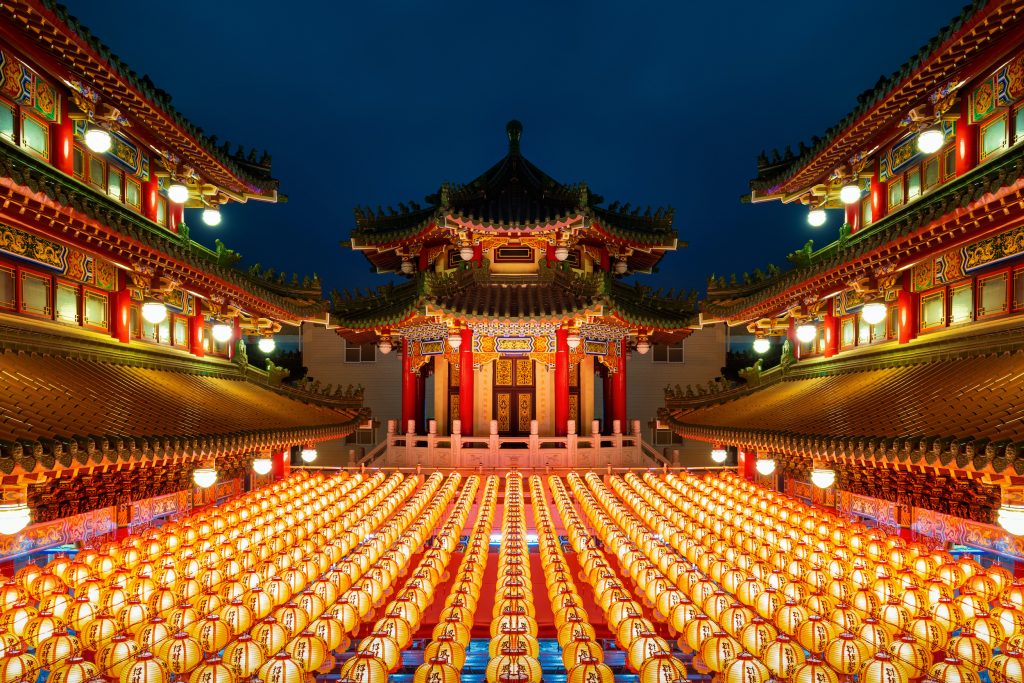
Chinese New Year Dates and Signs (2024-2034)
The following table provides a concise overview of the Chinese New Year dates from 2024 to 2034, along with the corresponding holiday periods and animal signs. This guide is useful for understanding the yearly variation in the celebration dates and their associated zodiac animals.
| Year | Date | Holiday Period | Animal Sign |
|---|---|---|---|
| 2024 | Feb. 10 (Sat) | Feb. 10-17 | Dragon |
| 2025 | Jan. 29 (Wed) | Jan. 28-Feb. 3 | Snake |
| 2026 | Feb. 17 (Tue) | Feb. 16-22 | Horse |
| 2027 | Feb. 6 (Sat) | Feb. 5-11 | Goat |
| 2028 | Jan. 26 (Wed) | Jan. 25-31 | Monkey |
| 2029 | Feb. 13 (Tue) | Feb. 12-18 | Rooster |
| 2030 | Feb. 3 (Sun) | Feb. 2-8 | Dog |
| 2031 | Jan. 23 (Thu) | Jan. 22-28 | Pig |
| 2032 | Feb. 11 (Wed) | Feb. 10-16 | Rat |
| 2033 | Jan. 31 (Mon) | Jan. 30-Feb 5 | Ox |
| 2034 | Feb. 19 (Sun) | Feb. 18-24 | Tiger |
How to Celebrate Chinese New Year
If vibrant red lanterns and colorful lights are the major symbols of the Chinese New Year for Western people, there are a few rituals and customs to celebrate the arrival of the Lunar New Year for Chinese people.
1. House Cleaning and Decorating
About half a month before the year’s designated time, a thorough clean of the house is carried on to welcome the New Year at its best. After the in-depth cleaning, every house is decorated with red lanterns and traditional red decorations.
2. Family dinner on New Year’s Eve
On New Year’s Eve, the whole family reunites to have dinner with the whole family. The feast includes meat, fish, and vegetables.
3. Red Envelopes
The seniors will handle red envelopes with money for the family’s younger members. The money is wrapped in red packets to dispel evil spirits from the kids.
4. Firecrackers
Watching fireworks from 0:00 to 0:30 and even later on New Year’s Eve is common. According to legend, the fireworks scare away the monster Nian, which emerges at midnight.
5. Visiting Relatives
The 1st day of the New Year is spent at home, and a half-month then follows it spent visiting relatives. People bring gifts to one another’s homes and give red envelopes to the kids.
6. Folk Shows and Temple Fairs
Folk shows, fairs, and events are carried around till the 15th day of the 1st lunar month. This is also the time when people go pray at the temple.
As with any traditional holiday, observance varies depending on the individual, but in every case, food is heavily present during the celebration of the Chinese New Year.
That’s why we want to show you the most important and lucky Chinese New Year foods.

Top Lucky Foods to Eat for the Chinese New Year
Every food in China represents something, and symbolism is associated with every traditional dish eaten for the Lunar Year. These are the most important Chinese New Year Foods and their meanings:
1. Dumplings
Dumplings, a staple of Chinese cuisine, are associated with wealthiness: according to tradition, the more dumplings you eat during the New Year celebrations, the more money you can make in the New Year. It’s all more complex than this: different dumplings have different meanings.
Dumplings with sauerkraut are forbidden because they mean a poor and difficult future; it’s common to eat dumplings with cabbage and radish as a symbol of prosperity for the body and the mind.
In some China areas, people put a white thread inside a dumpling: the person who eats that dumpling is supposed to possess longevity.
It’s completely forbidden to arrange dumplings in circles: dumplings have to be arranged in lines to symbolize life going somewhere.
Before eating a dumpling, all the people at the dinner table have to say the following phrase: “Zhāo cái jìn bǎo,“ which means “Bringing in wealth and treasure.”
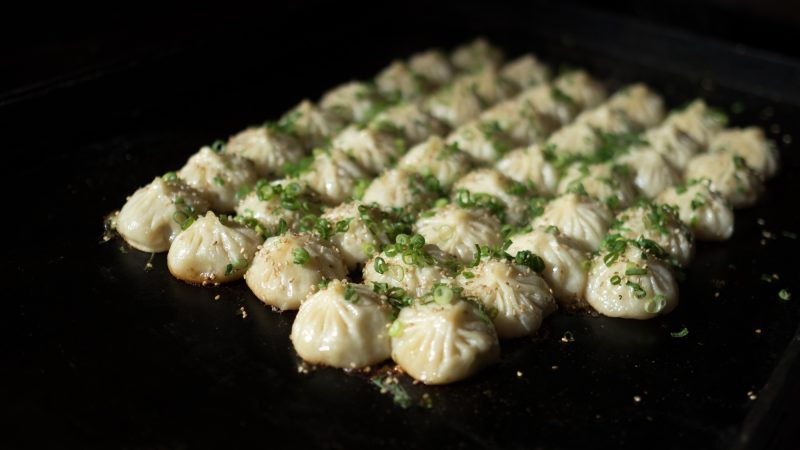
2. Spring Rolls
Spring Rolls refers specifically to eating this dish during the Lunar Year (also called the Spring Festival). There are no specific rules to follow regarding spring rolls, but it’s common to say the phrase “A ton of gold,“ referring to this dish as a carrier of prosperity.
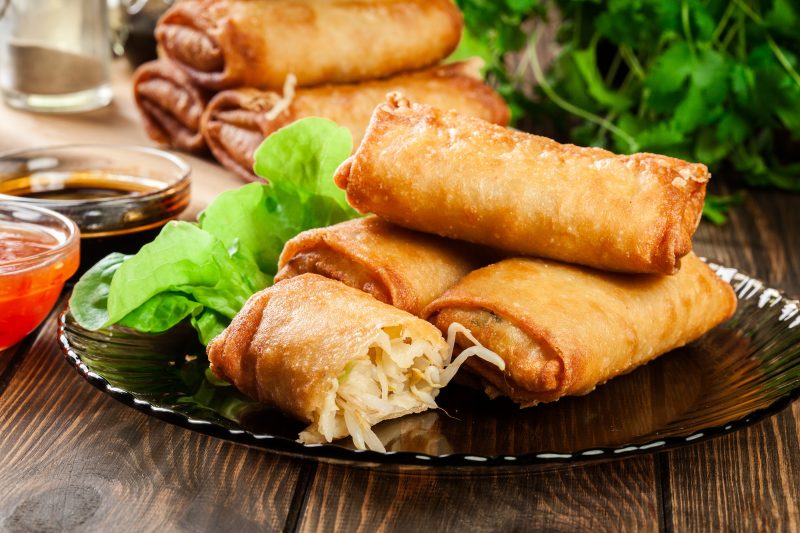
3. Niangao
Nian Gao is a traditional glutinous rice cake made of sticky rice, sugar, chestnuts, dates, and lotus leaves. Eating Nian Gao is accompanied by the phrase “Getting higher year after year by year,” meaning a general improvement in life.
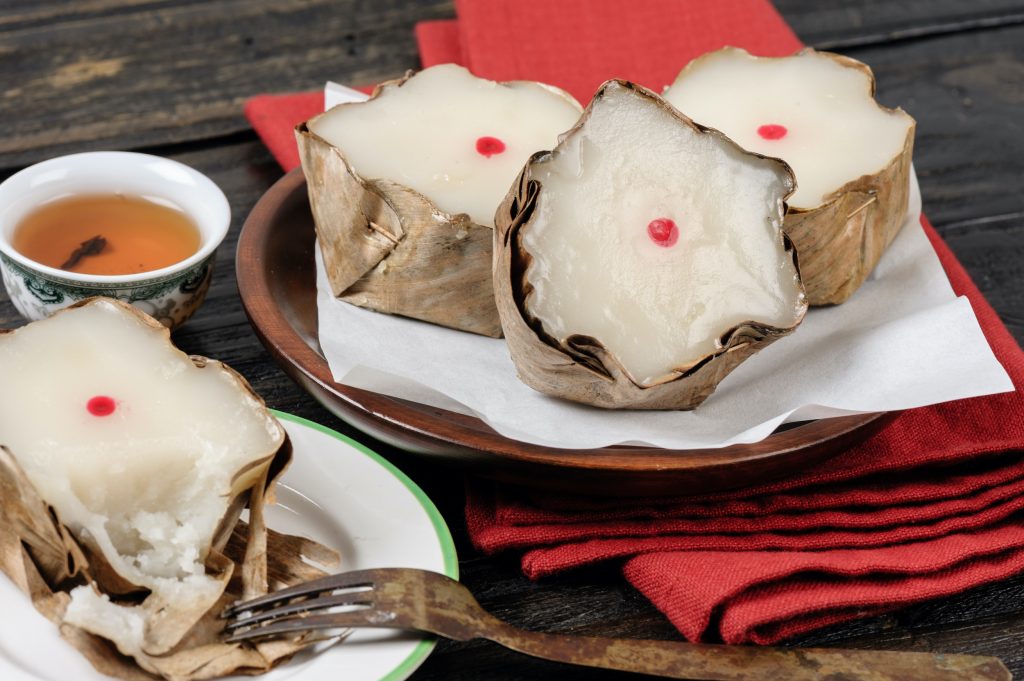
4. Sweet Rice Balls
The rice balls are a staple of Chinese celebrations: their rounded shape is associated with reunion and being together.

5. Noodles
The so-called Longevity Noodles symbolize longevity: they are longer than normal noodles and uncut. The longer, the better.
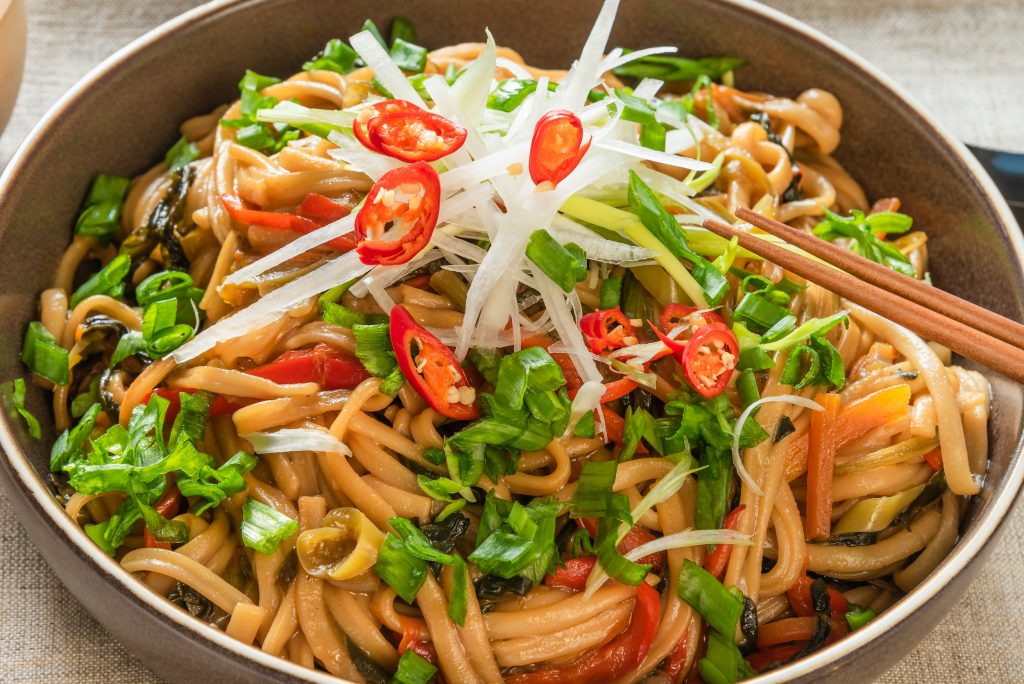
6. Fish
Fish is a traditional Chinese New Year dish, and it’s usually steamed. Different types of fish can be served based on the family’s wishes:
- Crucian carp: eating crucian carp brings good luck for the next year;
- Chinese mud carp: eating Chinese mud carp brings good fortune;
- Catfish: eating catfish is a wish for a surplus in the year.
The fish should be the last dish left on the dinner table with some leftovers: the fish is considered a good omen to having more money in the upcoming year. For this reason, the fish has to be carefully positioned on the dinner table:
- The head should be placed toward distinguished guests or elders;
- Diners can enjoy the fish only after the one who faces the fish head eats first;
- The fish shouldn’t be moved.
Eating the fish is accompanied by the popular saying, “May you always have more than you need!”.
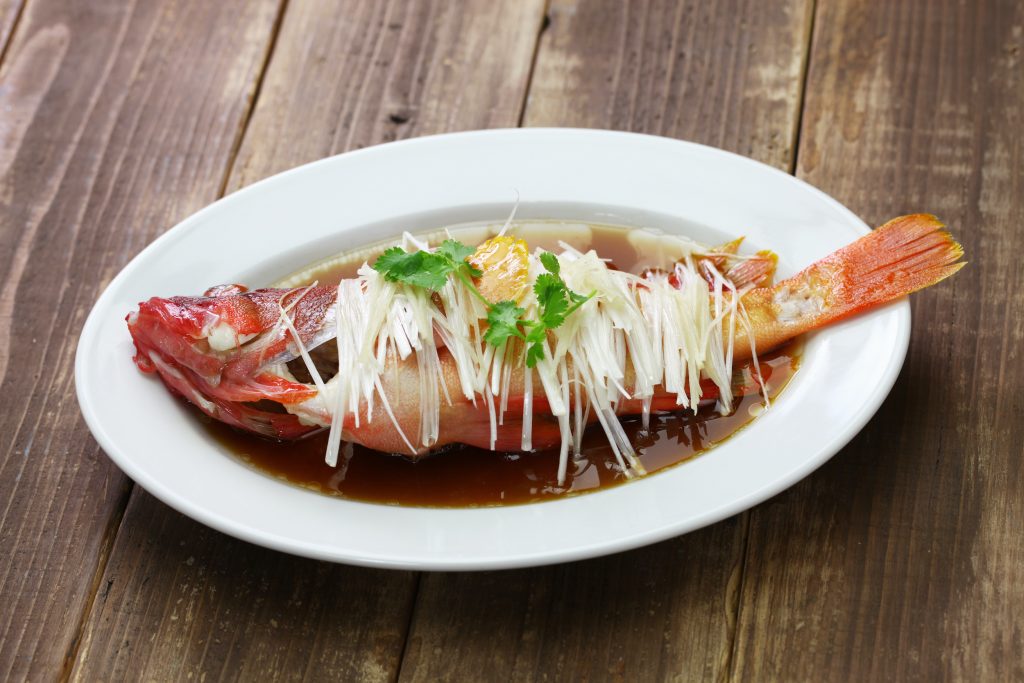
7. Steamed Chicken
A whole chicken is another symbol of the family; that’s why, once cooked, Chinese people first offer the chicken to the ancestors asking for blessings and protection.
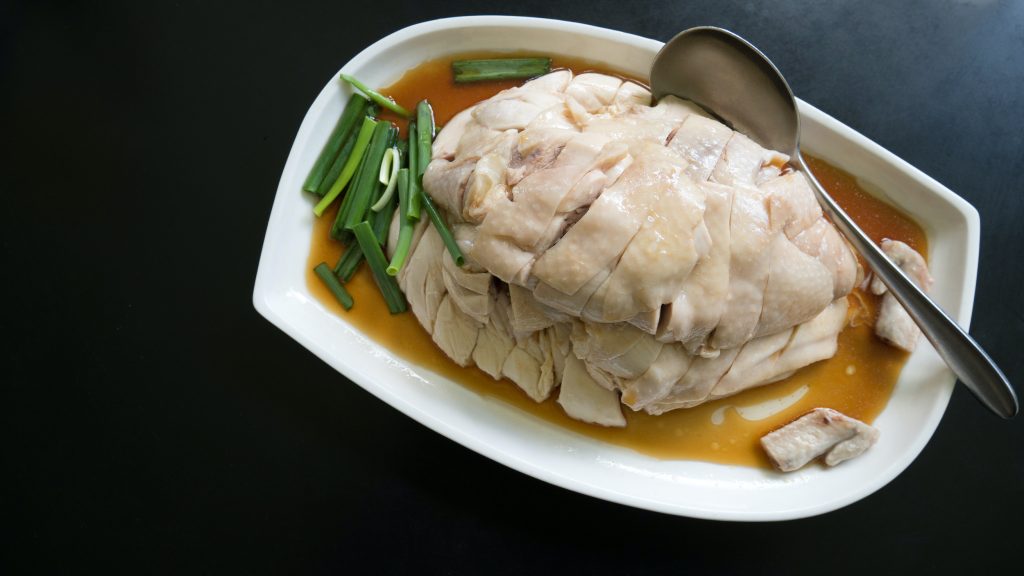
8. Fruit and Vegetables
Vegetables play an important role in a Chinese dinner table, each symbolizing something specific.
- Bamboo shoots: represent longevity;
- Poria mushrooms: represent blessings and fortune;
- Muskmelon and grapefruit: represent family;
- Seaweed: represents wealth and fortune.
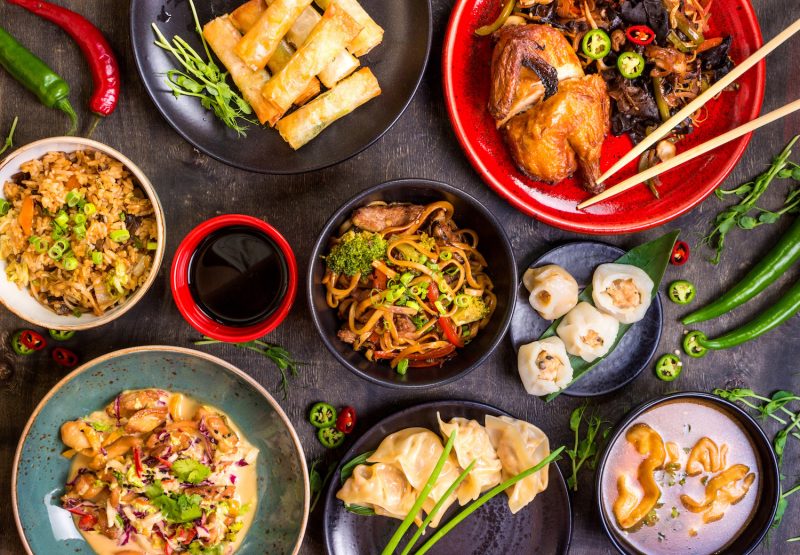
9. Fa Gao
Fa Gao is a typical Chinese dessert made with soaked rice ground into a paste and steamed. Exactly like Nin Gao, it is a wish for success.
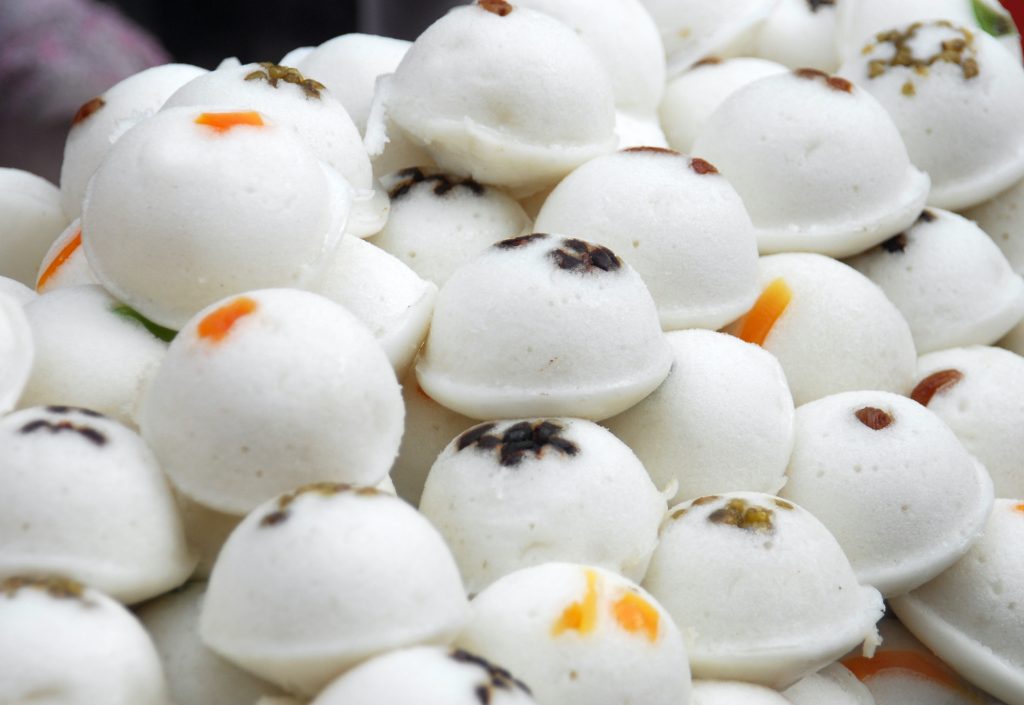
Chinese New Year’s Dining Etiquette: Do and Don’t
Eating in a traditionally Chinese environment during the New Year Celebrations can be hard because there are many things to remember when it comes to dinner manners. We have listed some of them below:
- Never stick your chopstick into a bowl of rice: it’s very disrespectful because it is considered bad luck;
- Never tap your bowl with chopsticks: it’s rude to the hosts;
- Always eat with your mouth closed and never slurp: unlike in Japan, in China, slurping is considered extremely rude;
- Never start eating before your host, and always serve someone else first before you serve yourself;
- Never pass a piece of food to someone with your chopsticks.
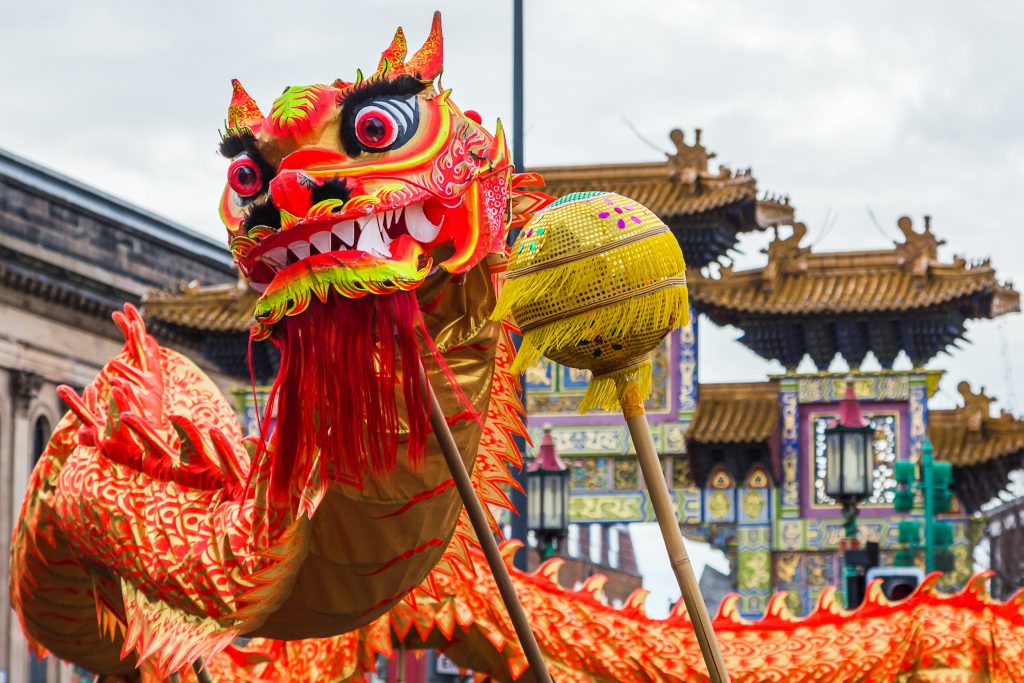
What is bad luck for the Chinese New Year?
Celebrations mean some taboos are part of Chinese culture. Among them:
- Showering isn’t allowed on New Year’s Day;
- Sweeping and throwing out the garbage isn’t allowed before the 5th day of the New Year;
- Haircutting is forbidden before the first 7 days;
- Arguing and swearing is forbidden;
- Breaking things brings bad luck;
- All words with negative connotations are forbidden;
- Using scissors, knives, or other sharp objects is forbidden because they will cut your stream of wealth and success;
- Taking medicines should be avoided to avoid being sick the entire year.
How to say Happy New Year in Chinese?
To impress your Chinese friends, you must know how to say Happy New Year in Chinese! We don’t know a word in Chinese, but we’ve learned the simplest way of saying it:
xīn nián kuài lè
, which means exactly Happy New Year. This is the Chinese written form: 新年快乐.
Are you ready to celebrate the Chinese New Year and eat these good luck foods? We are, and we cannot wait!






